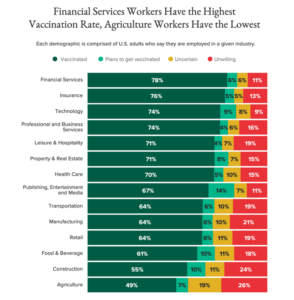Meat is happiness, toasting those masks, vaxes by profession, and more
16 Nov 2021
Posted by Andrew Kantor
Reusing masks is really easy
No autoclave, pressure cooker, or even chemicals needed.
Looking for fun ways to use their scanning electron microscope*, Rice University engineers used it check what happens to disposable masks when they’re cooked.
Cutting to the chase: Heating masks — including disposable surgical masks — for 160°F for five minutes kills any viruses on them, including the only one anyone cares about these days. And it meets FDA guidelines.
Notes: Higher temp decontamination (320°F) melted the masks’ fibers, ruining them. And if you insist on using Celsius for some misguided reason, set your oven to 70°C
* Taking pictures of insect faces gets old.
SSRIs vs Covid
When you have a lot of data, you can pull out a lot of useful info. In this case, UC San Francisco pediatrics researchers looked at records of about 500,000 people, including more than 83,000 adults with Covid-19, and 3,400 who were prescribed SSRIs.
You see where this is going. It seems that the patients taking fluoxetine, “were significantly less likely to die of COVID-19 than a matched control group.”
(SSRIs as a whole cut the risk of Covid death by 8 percent, but fluoxetine and its cousin fluvoxamine were a lot more effective, at 28% and 26% reduction, respectively.)
Two thumbs down against dementia (sort of)
Two unrelated drugs, both tested as ways to slow dementia, well, didn’t. Unfortunately.
After a trial of aspirin vs “all-cause mortality in the elderly,” there had been hope that everyone’s favorite miracle drug might have an effect on dementia. British researchers reviewing the results, though, said that…
…daily use of aspirin in healthy adults over the age of 70 did not reduce dementia, mild cognitive impairment, or cognitive decline.
(Actually, what they said was that there was little risk of harm, but only a small chance of benefit — not no chance.)
Meanwhile…
Other British researchers found that, despite some earlier hopes, hypertension-drug losartan “does not slow down the progression of more advanced Alzheimer’s.”
Note the phrase “more advanced.” The researchers said there might have been a reason for earlier positive results:
However, we cannot exclude the possibility, given other findings that are emerging, that losartan, or similar drugs, given to people earlier and for longer in their development of Alzheimer’s, such as folk with certain types of mild cognitive impairment, might still be protective.
Who’s getting vaccinated?
Instead of just looking at numbers by region, politics, or education, the folks at Morning Consult also broke down Covid vaccination status by profession.
Topping the list, surprisingly, were people in financial services and insurance, followed by those in technology.
(Caveat: “financial services” could refer to anyone from a part-time bank teller to the CEO of Bear Ste— of Lehman Br— um … the CEO of JP Morgan. And “technology” could be high-end programmers or the weird guy installing your cable.)
Healthcare workers were in the middle of the pack, while construction and agriculture were least likely to be vaccinated.
Gaining weight, loosing teeth
Another side effect of obesity: tooth loss. Yeah, dental researchers at the University of Buffalo found that obesity leads to chronic inflammation, and that can create cells (“myeloid-derived suppressor cells”), that break down bone tissue, “including the bone that holds teeth in place.”
You can’t beat meat
Want to be happier? Eat meat. Yep, psychologists at the University of Southern Indiana “extracted data from 20 existing studies, including cross-sectional and longitudinal studies, as well as randomized control trials” involving more than 171,000 participants across four continents. They found that…
…individuals who consumed meat experienced lower levels of depression and anxiety compared to individuals who abstained from meat.
And vegans — they were pretty bad off, “found to experience greater levels of depression compared to meat consumers.”
Oh, and the more rigorous the study they looked at, “the stronger the observed benefits of meat consumption.”
Pair it with some red wine*
“Red wine induces psychological states characterized by bliss, a focus on the present moment, an enhanced fascination with one’s surroundings, and a softening of the differentiation between oneself and the environment when consumed in a tranquil environment.”
* Fava beans on the side, perhaps?
The Long Read: Treatment Pills edition
“8 lingering questions about the new Covid pills from Merck and Pfizer”: Everything you want to know about both Covid-treatment pills — how they work, who can get them, how they compare, and of course, “Will it affect a patient’s DNA?” (If you thought the answer to that last one is “No, you silly goose!” you’re in for a surprise. Spoiler: Probably not, but maybe.)



